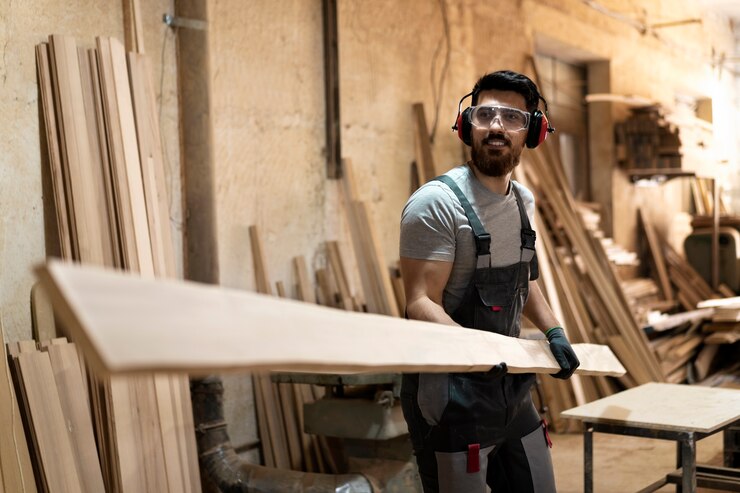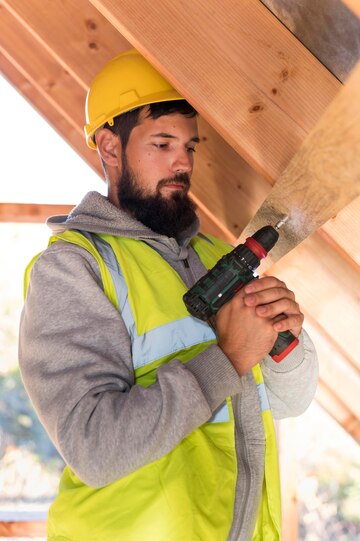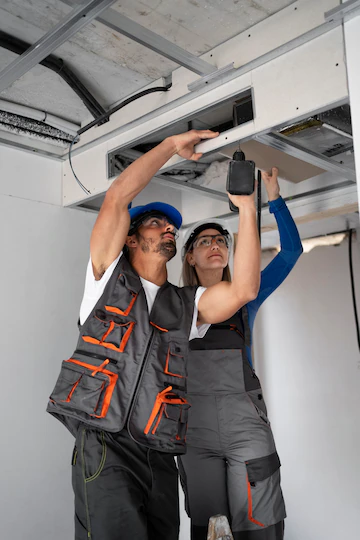How Much Do Masons Make?
Masonry is a skilled trade with its roots deep in history, yet it remains relevant in today’s construction industry. Masons work with a variety of materials, including brick, stone, and concrete, to build or repair walls, walkways, and other structures. The knowledge and precision a mason brings to a project are invaluable, which is reflected in their compensation.
The earning potential for masons can vary widely depending on various factors, such as geographical location, experience, and whether they focus on residential or commercial projects. In the United States, the average salary for a mason may range, with some earning upwards of $39,000 per year according to data from the U.S. Bureau of Labor Statistics.
Key Takeaways
- Masons are skilled tradespeople who specialize in constructing and repairing structures using various materials.
- Earnings for masons can vary based on experience, location, and the type of projects they undertake.
- The job market for masonry work is nuanced, with an expected slight decline, yet opportunities arise from the need for replacing workers.
Overview of Masonry
Masonry is a skilled trade that encompasses the construction of structures through the laying and binding of individual units. This section provides an in-depth examination of masonry from its definition to the specific professions within the field.
What is Defining Masonry?
Masonry is defined by its core elements: the materials such as bricks, concrete blocks, or stones, and the mortar or cement used to bind these units together to create structures. This ancient art form is responsible for many of the durable constructions around us, ranging from historical monuments to residential walls.
Which Materials and Tools are Utilized?
The primary materials used in masonry include:
- Bricks: Made from clay, they are commonly used for building walls.
- Concrete blocks: These are larger than bricks and are often used in construction due to their sturdiness.
- Stone: Natural stones like granite, marble, and limestone are cut and fitted together for various construction projects.
As for tools, masons typically use:
- Trowels: Essential for applying mortar
- Levels: Ensuring the structure is perfectly horizontal or vertical
- Power tools: Such as mixers for mortar or cement
A mason’s expertise includes mixing and applying the right consistency of mortar or concrete for various applications, creating strong and stable structures.
How are Masonry Professions Categorized?
Masonry professionals can be grouped into three main categories:
- Brickmasons and Blockmasons: They focus on constructing or repairing walls and other structures using bricks or concrete blocks.
- Cement Masons: Also known as concrete finishers, they specialize in working with poured concrete to create foundations, sidewalks, and other flat surfaces.
- Stonemasons: These artisans cut and shape natural stone for building or decorative purposes.
The above are distinct professions within the trade of masonry, requiring specialization and concentrated skill development. They often work on different types of job sites, from residential to commercial and civil engineering projects.
Education and Training Requirements
To become a mason, candidates typically need a high school diploma or GED, supplemented with formal apprenticeships and certifications that provide both classroom learning and practical experience.
What Academic Background is Necessary?
A high school diploma or equivalent is usually the minimum requirement to enter into masonry. This foundation supports the understanding of basic mathematical concepts and comprehension skills, which are integral in this field. Some individuals may also choose to enhance their academic background by attending vocational schools or community colleges that offer programs in masonry, though this is not always essential for securing employment.
How Important are Apprenticeships and Certifications?
Apprenticeships are paramount for masons to gain the moderate understanding and skills necessary for the trade. These programs pair them with senior personnel and provide a mix of on-the-job training and classroom instruction. Typically, an apprentice will complete several thousand hours of hands-on work while they learn the trade. To be recognized as a qualified mason, obtaining certifications from recognized trade organizations can add credibility and acknowledge the specialized skills obtained during their apprenticeships. Such certifications often require passing an exam and demonstrating competency in the trade.
Earning Potential
The earnings of masons can reflect a range of factors including geographic location, experience, and the levels of demand in various areas. Their income may also vary significantly between individuals due to overtime work, where those clocking extra hours can receive higher overall compensation.
What are the Factors Influencing Salary?
Several elements determine a mason’s salary. Education, certifications, experience, and more specialized skills can command higher wages. Additionally, the number of years they have worked in the profession can lead to higher pay. Salaries in this field can be influenced by the economy and construction industry demand, as periods of high construction activity can increase earning potential due to overtime.
- Experience: More experienced masons can earn higher wages.
- Certifications: Possession of certain industry-recognized certifications may result in a salary increase.
- Skills: Specialized skills can set a mason apart and boost their earning potential.
How Does Geographic Location Impact a Mason’s Salary?
A mason’s location greatly affects their earning potential. States such as Massachusetts, Hawaii, New Jersey, and New York typically offer higher pay. Major cities like Boston and Chicago also rank as some of the best-paying cities for this profession due to the higher cost of living and increased demand for specialized construction work.
- Best-Paying States: States like Massachusetts and New York.
- Metropolitan Areas: Cities such as Boston provide greater opportunities for higher wages.
What is the Salary Progression for Masons?
Masons typically start with an entry-level salary that increases with experience and skill development. Median salaries for brickmasons and blockmasons, for instance, were reported at $59,000 in 2022, with the best-paid 25% making $74,000 and the lowest-paid 25% earning $47,300. Salary progression can continue as masons take on more complex projects or start their own businesses.
- Median Salary: Reflective of a mid-range earning potential in the trade.
- Salary Outlook: Prospects for wage increases are tied to experience, location, and economic factors.
Day-to-Day Work
The day-to-day work of a mason revolves around meticulous craftsmanship in construction projects. They must possess a keen eye for detail and physical endurance.
What Are the Typical Tasks and Responsibilities?
Masons typically engage in constructing and repairing structures using various materials such as bricks and stones. Their responsibilities include:
- Laying Out Patterns and Foundations: They start by interpreting blueprints and laying out patterns for masonry work.
- Stacking Bricks and Stones: Masons skillfully stack bricks or stones, ensuring each layer is meticulously aligned.
- Applying Mortar: They apply mortar between layers to bond the construction materials together.
- Scraping Off Excess: Excess mortar is scraped off to maintain a clean and professional finish.
- Creating Expansion Joints: They install expansion joints to allow for the natural movement of the structure without causing damage.
How Does the Work Environment and Conditions Affect Masons?
The work environment for masons is generally outdoors, and they must be prepared to work in various weather conditions. Key aspects include:
- Varying Locations: Masons may work at different locations, from residential sites to large commercial projects.
- Exposure to Elements: They often face exposure to the elements, such as extreme heat, cold, or wet conditions.
- Safety Protocols: Strict safety protocols are in place due to the risk of injury from tools, materials, and the physical nature of the job.
What Are the Physical Demands of Masonry?
Masonry positions are physically demanding and require substantial:
- Bending and Lifting: Masons often bend to lift and place heavy materials.
- Hours of Standing: They typically spend long hours standing and must ensure structures are perfectly level.
- Manual Dexterity: Hand-eye coordination and fine motor skills are crucial for achieving precision in laying bricks and applying mortar.
- Stamina: The job requires excellent physical stamina to sustain energy throughout the workday, often in strenuous positions.
Masons utilize their expertise to create durable floors and walls, shaping the strength and aesthetics of the built environment with precision and care.
Job Market Outlook
The economic landscape and technological advances shape the job market for masonry workers, influencing both demand and salary expectations. Trends indicate varying opportunities across the different specializations within the masonry field.
How Are Employment Trends Affecting Masonry Workers?
Employment of masonry workers is set to experience a slight decline, with a projected 3 percent decrease from 2022 to 2032. Despite this trend, an average of about 21,200 job openings per year is expected, primarily due to the replacement of workers moving into other occupations or retiring. This suggests that while the market may contract, the need for skilled masonry workers will continue as a constant for maintaining existing structures and completing new projects in heavy and civil engineering construction.
What Is the Role of Masonry in Construction?
Masonry remains a critical and irreplaceable functional area in the construction industry. Masons lay and bind building materials with mortar and other substances, a skill essential for creating and repairing a wide range of structures. The versatility of masonry work, from bricks and blocks to terra-cotta, extends its relevance in both traditional and innovative construction projects. With a strong job description management tool, employers can better match candidates to the specificity required in different masonry roles in construction, enabling them to tackle complex structural tasks.
Career Advancement and Specializations
In the field of masonry, career progression typically involves gaining experience, enhancing skills, and potentially moving into supervisory roles. Specializations, on the other hand, afford masons the opportunity to focus on specific materials or construction techniques.
How Does One Move up the Ladder in Masonry?
Most masons start their careers as apprentices, learning the trade on the job under the guidance of more experienced workers. As they acquire skills and knowledge, they may progress to journeyman status, where they can work independently. Supervisors or foremen positions are the next steps in career advancement. This role involves overseeing the work of other masons and ensuring that projects adhere to specifications. It also often requires additional skills in project management and leadership.
- Apprentice: Starting point for most masons.
- Journeyman: Independent working status after accumulating experience.
- Supervisor/Foreman: Involves project oversight and team management.
What Specializations Exist within Masonry?
Specializations in masonry allow workers to focus on particular materials or construction methods, becoming experts in their chosen niche. Brickmasons and blockmasons concentrate on constructing and repairing walls and other structures using bricks and concrete blocks. Cement masons and concrete finishers deal with pouring, smoothing, and finishing concrete for floors, stairways, sidewalks, and roads. They may use a variety of tools to create a polished finish. Some masons may further specialize, working exclusively on historical restorations or custom-designed architectural projects.
- Brickmason: Specializes in brick-related construction.
- Blockmason: Works with concrete blocks for structural work.
- Cement Mason: Expert in creating surfaces and structures out of cement.
- Concrete Finisher: Specializes in smoothing and finishing poured concrete.
Specializations can lead to greater employability and the potential for higher earnings, as specialized skills are often in high demand.
Frequently Asked Questions
This section addresses common inquiries regarding the earnings of masons, providing specific figures to give a clear picture of their financial expectations within the field.
What is the average annual salary for a mason?
A mason in the United States, on average, makes about $52,900 annually.
What income can a mason expect per month?
Monthly earnings for a mason can be roughly estimated at $4,408, considering the average annual salary.
What is the typical hourly wage for a brick mason?
The hourly wage for a brick mason typically ranges from $16.08 to $39.67, depending on experience and location.
How much can masonry business owners earn in a year?
Owners of a masonry business can see wide variations in their yearly earnings, but they can potentially make significantly more than salaried masons, depending on the success of their business operations.
Which state offers the highest wages for masons?
States with higher costs of living commonly offer higher wages for masons, with some of the top-paying regions being located in the Northeast and West Coast of the United States.
Can you describe the job duties and common tasks of a mason?
Masons are skilled at tasks such as constructing and repairing structures using various materials like brick and stone, diagnosing structural issues, ensuring safe working conditions, and sometimes supervising project sites.






